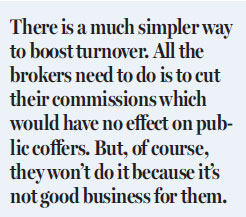Business people with vested interests oppose policy changes

The government has summoned up the courage and will to shake loose the constraints of a well-proven economic policy and chart a fresh course deemed necessary to face the myriad new challenges posed by an unfamiliar social and economic environment.
But the important business sector in this traditionally capitalistic town has yet to realize the significance of these inevitable changes. Business people in all the major economic sectors, including finance, property and retail, are still engrossed in the single-minded pursuit of immediate profit at the expense of almost everything else, including their social responsibility.
Some property developers have complained they are being unfairly singled out for public ridicule, arguing that their contributions to housing many thousands of families should not be ignored. They may have a point. Indeed, the major developers were once lionized like sports stars and served as role models to many young people.
Public perception of real-estate tycoons has drastically changed for the worse since home prices surged in the past couple of years. They are widely maligned for profiteering by cornering the supply to push up prices, forcing many families to stretch household budgets to the limit to buy homes.
These developers are now given a chance to build a better image of themselves in the eyes of the public by the government. Instead of supporting the latest government initiatives to provide "affordable" housing for sale to first-time homebuyers, they have largely distanced themselves from the proposal.

What's worse, some real-estate agents have openly expressed doubts about the government plan while threatening prospective homebuyers that if they don't buy now with whatever means they can muster, they will never be able to afford doing so later. A property agent was quoted in a mass-circulation newspaper as flatly saying home prices in Hong Kong can only go up irrespective of what the government tries.
Such cynicism can greatly hamper the government plan by deepening public resentment against property developers and raise suspicion that developers will exact a stiff price in exchange for cooperation to build affordable housing on part of the farmland they own in the New Territories. In fact, a little good public relations work on the part of the developers can go a long way in helping smooth the tedious and complicated negotiations over proposed government housing projects.
But it is hard for the developers, who are used to having their way, to adopt a softer stance that is seen as a show of weakness, or even worse, a loss of face, in this hard-nosed business town. The same goes for professionals in the financial sector, another major pillar of the local economy.
Backed by the stock exchange, the stockbroker community staged stiff resistance against a proposal to restructure the listing committee, giving regulators a bigger say in the vetting process. The brokers dug in their heels despite the shortcomings of the existing arrangement being shown up by a spate of scandals that rocked the Growth Enterprise Market.
The matter was settled by a compromise which basically lets the regulator do what it asked for without the need to restructure the stock exchange listing committee. But the high-profile objection from the stock exchange has given the impression it puts the interests of its members, who are also shareholders, ahead of its fiduciary duty to the public in general and investors in particular. As a monopoly, the stock exchange is trusted by the government with the responsibility to preserve the integrity of the market and enhance Hong Kong's reputation as an international financial center.
The government is right to ignore the stock exchange's plea to reduce stamp duty, or tax, on transactions to help boost market turnover. The tax is an important source of revenue to the government and it is debatable whether cutting it can help increase the flow of investment funds into Hong Kong, which would bring real benefit to Hong Kong, rather than simply encouraging stock churning by making it less costly to do so.
There is a much simpler way to boost turnover. All the brokers need to do is to cut their commissions which would have no effect on public coffers. But, of course, they won't do it because it's not good business for them.
The author is a veteran current affairs commentator.
(HK Edition 11/01/2017 page8)
Today's Top News
- Cross-border research work bearing fruit
- Disrupting market under fabricated veneer of 'national security' hurts US' own interest: China Daily editorial
- Yasukuni visit would add insult to injury: China Daily editorial
- Judicial reform critical for modernizing governance
- Effective use of investment emphasized
- China's shuttle diplomacy strives to reach ceasefire






























